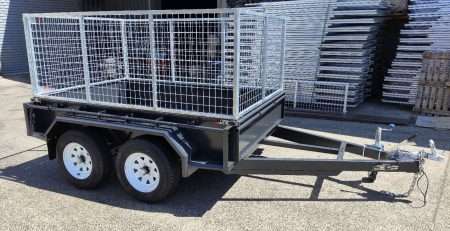
Upgrade Your Car Shipping Game: Premium Car Carrier for Sale
Introduction to Car Carriers
Car carriers play a crucial role in the transportation of vehicles, whether it’s for personal or commercial purposes. In this section, we will explore what a car carrier is and discuss the importance of these specialised vehicles.
What is a car carrier?
A car carrier, also known as an auto transporter or car haulier, is a type of trailer or truck designed specifically for transporting vehicles from one location to another. These carriers are equipped with features that ensure the safe and efficient transportation of cars, trucks, and other automobiles.
Car carriers come in various forms, including car carrier trailers, car carrier trucks, and enclosed car carriers. They are designed to accommodate multiple vehicles, allowing for the transportation of several cars in a single trip.
Importance of Car Carriers
Car carriers play a vital role in the automotive industry and transportation sector. Here are a few reasons why car carriers are essential:
- Efficient Transportation: Car carriers enable the transportation of multiple vehicles simultaneously, making them a cost-effective and efficient method of moving cars from one place to another. This is particularly beneficial for car dealerships, auto manufacturers, and individuals who need to transport multiple vehicles.
- Protecting Vehicles: Car carriers are designed with features that help protect vehicles during transit. For example, enclosed car carriers provide additional protection from weather conditions, road debris, and potential damage that can occur during transportation.
- Safe and Secure: Car carriers are equipped with specialised loading and securing mechanisms to ensure that vehicles remain stable and secure during transit. This helps prevent accidents, damage, and the shifting of vehicles while on the road.
- Time-saving: By utilising car carriers, the transportation time for multiple vehicles is significantly reduced. This is especially beneficial for businesses that need to move vehicles quickly, such as car rental companies, dealerships, and fleet management companies.
- Flexibility: Car carriers cater to a wide range of transportation needs. Whether it’s for short distances or long-haul journeys, car carriers offer flexibility in terms of the number of vehicles transported and the destinations covered.
When considering the purchase or rental of a car carrier, it’s important to assess specific requirements, such as load capacity, dimensions, and any additional features needed. This will ensure that the car carrier meets the transportation needs of the vehicles being transported.
In the next sections, we will explore the buying and selling of car carriers, popular car dealerships, specific car carrier models such as the 4 Car Carrier by Miller Industries, as well as motor vehicle safety regulations and considerations for choosing a car haulier trailer.
Buying and selling car carriers
When it comes to purchasing or selling car carriers, there are various considerations to keep in mind. Whether you are in Virginia or exploring the global market for used cars, understanding the options available and the best platforms for buying and selling can be essential. Let’s delve into the specifics.
Car Carriers for Sale in Virginia
If you are located in Virginia and are interested in buying or selling a car carrier, there are several avenues to explore. The Department of Motor Vehicles (DMV) in Virginia provides resources and guidelines for individuals looking to engage in vehicle transactions, including the purchase and sale of car carriers (DMV Virginia). It’s important to familiarise yourself with the regulations and requirements set forth by the DMV to ensure a smooth and legal transaction.
The Global Market for Used Cars
The global market for used cars is a thriving industry, projected to reach a value of $1,705.7 billion by 2027, with a compound annual growth rate (CAGR) of 5.5% from 2020 to 2027 (Montway). This indicates the popularity and demand for pre-owned vehicles, including car carriers.
The Best Used Car Sites in the United States
When it comes to buying or selling car carriers in the United States, there are several reputable online platforms available. Autotrader, Cars.com, and CarGurus are among the best used car sites, offering a wide range of options for both buyers and sellers. AutoTraderr, for instance, boasts over 1.7 million vehicles listed for sale, making it one of the largest used car sites (Montway). Cars.com offers a comprehensive search experience, allowing users to filter their searches based on vehicle type, price range, and mileage. These platforms provide a convenient and efficient way to navigate the used car market and connect with potential buyers or sellers.
By exploring car carriers for sale in Virginia and tapping into the global market for used cars through reputable online platforms, you can find the right buyer or seller for your car carrier. Whether you are a buyer or seller, it’s essential to conduct thorough research, consider the condition and specifications of the car carrier, and ensure compliance with relevant regulations.
Popular car dealerships
When it comes to purchasing a car, choosing the right dealership is essential. In the United States, there are numerous car dealerships that offer a wide range of vehicles to suit every individual’s needs and preferences. In this section, we will explore some of the top car dealerships in the country and discuss the average price of cars sold by these dealerships.
Top Car Dealerships in the United States
Americans purchased over 15 million vehicles in 2021 from the top car dealerships across the nation (source). These dealerships have earned their reputation by providing exceptional customer service, a diverse inventory, and competitive pricing. Some of the most renowned car dealerships in the United States include:
- CarMax Inc.: CarMax Inc. is a leading retailer of new and used cars, selling over 800,000 vehicles annually, which is nearly 40 times the sales volume of the best-selling brick-and-mortar car dealers in the country. They offer a wide selection of vehicles and have locations throughout the United States.
- Longo Toyota: Located in El Monte, California, Longo Toyota is one of the largest Toyota dealerships in the United States. They sell approximately 25,000 to 30,000 vehicles per year, providing customers with a vast range of Toyota models to choose from (source).
These are just a few examples of the top car dealerships in the United States. Each dealership offers its own unique advantages, such as a diverse inventory, competitive pricing, and exceptional customer service. It’s important to research and visit different dealerships to find the one that best suits your needs and preferences.
Average Price of Cars from Dealerships
In 2022, the average price of a car from car dealerships in the United States was over $48,000. The price of a car can vary depending on various factors, including the make, model, year, and additional features. Luxury vehicles and high-performance cars tend to have higher price tags compared to economy or compact cars.
It’s worth noting that the average price mentioned is a general estimate, and prices can differ significantly based on the dealership, location, and individual negotiations. It’s always recommended to do thorough research, compare prices, and negotiate with dealerships to ensure you’re getting the best possible deal on your desired vehicle.
When purchasing a car from a dealership, it’s important to consider factors beyond the price, such as warranty, financing options, and after-sales service. Additionally, be sure to inspect the vehicle thoroughly and take it for a test drive to ensure it meets your expectations.
By exploring the top car dealerships and understanding the average price range, you can make an informed decision when purchasing your next vehicle. Remember to consider your budget, preferences, and specific requirements to find the dealership that best aligns with your needs.
The 4-Car Carrier by Miller Industries
When it comes to efficient and reliable car carriers, the 4-Car Carrier by Miller Industries stands out as a top choice. Designed to maximise profit without compromising strength or safety, this carrier is built to meet the demands of the industry.
Features of the 4-Car Carrier
The 4 Car Carrier features a proven 20,000 lbs. heavy-duty aluminium 3 and 4-car carrier decks, combining an independent wheel lift and an over-the-cab deck for efficient multi-vehicle hauling (Miller Industries). The sturdy construction of the carrier ensures durability and longevity, allowing you to transport vehicles with confidence.
Key features of the 4-Car Carrier include:
- Payload Capacity: With a payload capacity optimised for profitability, this carrier helps maximise the equipment’s payload per mile.
- Aluminium Decks: The heavy-duty aluminium decks provide strength while keeping the weight of the carrier manageable.
- Independent Wheel Lift: The independent wheel lift allows for easy loading and unloading of vehicles, enhancing efficiency.
- Over-the-Cab Deck: The over-the-cab deck provides additional space for vehicle transportation, allowing you to haul more cars in a single trip.
Please note that the specifications shown are approximations and may vary depending on the chassis selected. Miller Industries reserves the right to change or modify product specifications without notice or obligation. Some of the equipment shown may be optional (Miller Industries).
Mounting Requirements for the 4-Car Carrier
For optimal performance, the 4-car carrier should be mounted on a chassis with low-profile cabs and a minimum front axle weight rating (FAWR) of 12,000 lbs. for the cab carrier (Miller Industries). It’s important to ensure that the chassis meets these requirements to ensure the stability and safety of the carrier during transportation.
Miller Industries, the world leader in towing and recovery equipment, has a reputation for delivering high-quality products that meet industry standards (Miller Industries). With the 4 Car Carrier, you can trust that you’re investing in a top-of-the-line car carrier that will meet your hauling needs.
When considering a car carrier for sale, it’s important to explore different options and select one that aligns with your requirements. The 4-Car Carrier by Miller Industries offers a range of features designed to enhance efficiency and safety during vehicle transportation.
Motor Vehicle Safety Regulations
To ensure the safety of vehicles on the road, motor vehicle safety regulations are in place. These regulations establish standards and requirements for various aspects of vehicle safety. Let’s take a closer look at the overview of motor vehicle safety regulations and the definitions and standards outlined within them.
Overview of Motor Vehicle Safety Regulations
Motor vehicle safety regulations are designed to protect drivers, passengers, and pedestrians by establishing guidelines and standards for the safe operation of vehicles. These regulations cover a wide range of topics, including safety standards for lamps and reflective devices, seat belt requirements, braking systems, child restraint systems, and more. They are continuously updated to address emerging safety concerns and advancements in vehicle technology.
The motor vehicle safety regulations are current as of November 27, 2023, and were last amended on November 8, 2023 (Justice Laws Website). The relevant authorities enforce these rules to ensure adherence and improve road safety.
Definitions and Standards in the Regulations
The motor vehicle safety regulations include definitions and standards for various terms related to vehicle safety. These definitions help establish a common understanding of key terms used throughout the regulations. Some examples of defined terms include “accessory mass,” “adjacent seat,” “adjustment hardware,” “air brake system,” and “all-terrain vehicle” (Justice Laws Website).
In addition to definitions, the regulations outline standards for different vehicle types and components. These standards ensure that vehicles meet specific safety requirements. For example, the regulations specify safety standards for auto transporters, buses, trailers, motor homes, motorcycles, and more. They also establish requirements for various vehicle components and systems, such as brake systems, lighting systems, tyres, steering controls, fuel systems, and more.
By adhering to the definitions and standards set forth in the motor vehicle safety regulations, manufacturers, distributors, and drivers can contribute to a safer road environment. These regulations play a crucial role in ensuring that vehicles meet minimum safety requirements and help protect the lives of those on the road.
For more information on car carriers and related topics, you can explore our articles on car carrier trailer, car carrier rental, car carrier transport, car carrier truck, car carrier shipping, car carrier load boards, car carrier service, enclosed car carrier, and car carrier company.
Choosing a Car Haulier Trailer
When it comes to transporting vehicles, a reliable and well-suited car haulier trailer is essential. There are different types of car haulier trailers available, each with its own features and benefits. In this section, we will explore the types of car haulier trailers and the considerations to keep in mind when choosing one.
Types of Car Haulier Trailers
Car haulier trailers come in two main types: open trailers and enclosed trailers.
- Open Trailers: Open trailers are cost-effective and commonly used for transporting vehicles. They provide easy access and are suitable for towing multiple vehicles at once. Open trailers are often preferred for shorter distances or when weather conditions are favorable. They are also popular for car carrier rental and car carrier transport services.
- Enclosed Trailers: Enclosed trailers offer more protection and security for the vehicles being transported. They safeguard the vehicles from the elements, road debris, and potential theft. Enclosed trailers are a popular choice for transporting high-value or classic cars that require extra care and protection. Both car carrier shipping companies and car carrier service providers frequently use them.
Consider the nature of your transportation needs and the value of the vehicles being towed when deciding between open and enclosed trailers.
Considerations for Choosing a Car Haulier Trailer
When selecting a car haulier trailer, there are several factors to consider:
- Size and Weight Capacity: Ensure that the trailer you choose can accommodate the dimensions and weight of your vehicles. It’s important to select a trailer with adequate space and weight capacity to safely transport your vehicles. Oversized or overloaded trailers can lead to safety hazards and potential damage to the vehicles.
- Material and Durability: Invest in a high-quality car haulier trailer made from sturdy materials like steel or luminum. These materials offer durability, strength, and longevity to withstand the rigours of transportation. A well-built trailer will provide peace of mind and ensure the safety of your vehicles during transit.
- Braking System: Car haulier trailers can have either surge brakes or electric brakes. Electric brakes offer more control and efficiency, especially when towing heavier loads. Consider the weight of the vehicles you will be transporting and select a trailer with an appropriate braking system to ensure safe and smooth towing.
- Lighting System: Proper lighting is crucial for safe towing, especially at night or in adverse weather conditions. Ensure that the car haulier trailer has functional brake lights, turn signals, and taillights. Adequate lighting enhances visibility and alerts other drivers on the road, reducing the risk of accidents.
By considering these factors, you can choose a car haulier trailer that meets your specific needs and ensures the safe transportation of your vehicles. For a wide selection of car haulier trailers, including both open and enclosed options, you can explore reputable providers such as Car Carry railer. Whether you’re a car carrier company or an individual in need of a car haulier, selecting the right trailer is crucial for a successful and secure transport experience.
Mechanical Inspections for Vehicles
To ensure the safety and roadworthiness of vehicles, certain vehicles in Québec are required to undergo occasional or periodic mechanical inspections. These inspections are essential for identifying any potential mechanical issues and ensuring that vehicles meet the necessary safety standards set by the government.
Occasional and Periodic Inspections in Québec
In Québec, occasional and periodic inspections are conducted based on specific guidelines and timelines. The frequency of inspections depends on various factors, including the type of vehicle and its intended use. According to the Société de l’assurance automobile du Québec (SAAQ), new vehicles are not required to undergo mechanical inspections until 6 to 12 months after they are put into operation, depending on the type of vehicle.
The following are some key points regarding occasional and periodic inspections in Québec:
- Occasional Inspections: Occasional inspections are required for certain vehicles every 6 or 12 months. The specific interval depends on the type of vehicle and its usage. These inspections are crucial for ensuring that vehicles remain in safe operating condition.
- Periodic Inspections: Periodic inspections are mandatory for certain vehicles every 6 or 12 months. Again, the frequency of inspections depends on the type of vehicle and its intended use. These inspections help to identify any mechanical issues that may compromise the safety of the vehicle (SAAQ).
It’s important to note that new heavy vehicles with a gross vehicle weight rating (GVWR) of 4,500 kg or more, which must operate in other Canadian jurisdictions or in the United States, must undergo a mechanical inspection as soon as they are purchased, unless their owners have a recognised Preventative Maintenance Programme (PMP) (SAAQ).
Exemptions from mechanical inspections
While certain vehicles are required to undergo occasional or periodic inspections, there are exemptions for specific vehicles, regardless of their status or condition. These exemptions ensure that vehicles that meet certain criteria are not subject to these inspections. Additionally, there are certain vehicles that are exempt from periodic inspections altogether.
To determine whether a vehicle is exempt from occasional or periodic inspections, it is best to consult the guidelines provided by the SAAQ or seek guidance from a qualified professional.
It is crucial for vehicle owners in Québec to be aware of the occasional and periodic inspection requirements for their vehicles. By adhering to these regulations, owners can help ensure the safety and reliability of their vehicles on the road.
Author
I am Rahatul Ashiq Tamal. Another author of Muscle Trailers. Muscle Trailers is a well-known trailer brand in Sydney, Melbourne & Adelaide

How to Mount a Spare Tire on Your Trailer: A Simple Step-by-Step Guide
Trailer service centers receive over 1 million phone calls and 1.3 million emails each year about trailer maintenance problems....

How to Fix RV Roof Leaks: Simple Roof Leak Detection Guide for Beginners
Did you know DIY RV roof repairs can cost under $50? But undetected leaks could lead to substantially higher repair...

Starting a Food Truck Business in Australia: From Trailer Selection to Launch
The Australian mobile food market has evolved into a billion-dollar industry. This makes a food truck...
